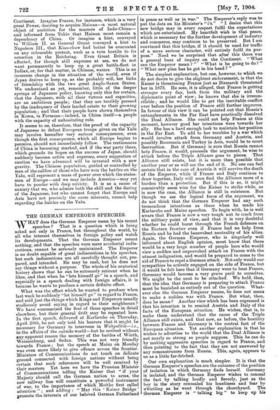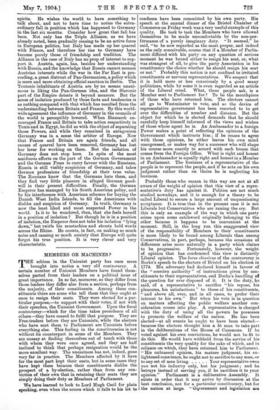What was the effect which he wanted to produce when
last week he suddenly "let himself go" in regard to France, and said just the things which Kings and Emperors usually studiously avoid saying in regard to their neighbours ? We have summarised the first of these speeches in detail elsewhere, but their general drift may be repeated here. In the first speech, delivered at Karlsruhe on Thursday, April 28th, he not only told his hearers that it might be necessary for Germany to intervene in Weltpolitik—i.e., in the affairs of the outside world—but he revived without any apparent reason the memory of the battles of Worth, Weissenburg, and Sedan. This was not very friendly towards France ; but the speech at Mainz on Monday was even more likely to give offence across the frontier. Ministers of Communications do not touch on delicate ground connected with foreign nations without being certain that such references will be well received by their masters. Yet here we have the Prussian Minister of Communications telling the Kaiser that " if your Majesty should call the German nation to arms, the new railway line will constitute a powerful instrument of war, to the importance of which Moltke first called attention " ; and adding : " May this Kaiser Bridge ' promote the interests of our beloved German Fatherland in peace as well as in war." The Emperor's reply was to put the dots on his Minister's " i's." " I desire that this new bridge may in every respect fulfil the expectations which are entertained. My heartfelt wish is that peace, which is necessary for the further development of industry and commerce, may continue to be preserved. But I am convinced that this bridge, if it should be used for traffic of a more serious character, will entirely fulfil its pur- pose." Need we be surprised that after this there was a general buzz of inquiry on the Continent. " What can the Emperor mean ? " " What is he going to do ? " " What new plan has he got in his head ? "
The simplest explanation, but one, however, to which we do not desire to give the slightest endorsement, is that the Kaiser is threatening France just as Bismarck threatened her in 1873. He sees, it is alleged, that France is getting stronger every day, both from the military and the diplomatic point of view ; he knows that she is irrecon- cilable ; and he would like to get the inevitable conflict over before the position of France still further improves. In favour of this view it can be pointed out that Russia's entanglements in the Far East have practically dissolved the Dual Alliance. She could not help France at this moment, however good her intentions were towards her ally. She has a hard enough task to maintain her position in the Far East. To add to her troubles by a war which would involve attack from Germany and Austria, and possibly Roumania and Turkey in Asia, would be to court destruction. But if Germany is sure that Russia cannot help France, it would, proceeds the argument, be wise to attack before the Triple Alliance goes to pieces. That Alliance still exists, but it is more than possible that another year or so will see the end of it. No one can feel certain that in the case of Austria it will survive the death of the Emperor, while if France and Italy continue to draw together, Italy will soon find the Alliance more of a burden than a protection. But if this is so, it might conceivably seem wise for the Kaiser to strike while, as is now the case, the Alliance is still in existence. But though we see the logical force of the argument, we do not think that the German Emperor had any such tremendous intentions as these when he made his Karlsruhe and Mainz speeches. To begin with, he is well aware that France is now a very touch nut to crack from the military point of view, and that it is very doubtful whether he could burst through the French defences on the Eastern frontier even if France had no help from Russia and he had the benevolent neutrality of his allies. Again, the German . Emperor, who is singularly well informed about English opinion, must know that there would be a very large number of people here who would view a sudden and unprovoked attack on France with the utmost indignation, and would be prepared to come to the aid of France to repel a German attack. Not only would our sympathies be actively engaged on the side of France, but it would be felt here that if Germany were to beat France, Germany would become a very grave peril to ourselves. We might be the next to be attacked. We hold, then, that the idea that Germany is preparing to attack Franco must be banished as entirely out of the question. What- ever else the German Emperor means, he does not mean to make a sudden war with France. But what, then, does he mean? Another view which has been expressed is that his intention is to remind Austria and Italy of the facts of the European situation. He wishes, that is, to make them understand that the cause of the Triple Alliance still exists, and that now, as before, the hostility between France and Germany is the central fact of the European situation. Yet another explanation is that he wishes to advertise to the world that the Dual Alliance is not nearly so strong as people suppose. This he can do by making aggressive speeches in regard to France, and then pointing to the fact that they are not answered by any remonstrances from Russia. This, again, appears to us as a little far-fetched.
Our own explanation is much simpler. It is that the German Emperor's speeches are the outcome of the position of isolation in which Germany finds herself. Germany is isolated, and the German Emperor wishes to conceal the fact by talking loudly and fiercely, just as the boy in the story concealed his loneliness and fear by whistling as he went through the churchyard. The German Emperor is " talking big " to keep up his spirits. He wishes the world to have something to talk about, and not to have time to notice the extra- ordinary fall in position which has happened to Germany in the last six months. Consider how great that fall has been. Not only has the Triple Alliance, as we have already noted, been gradually ceasing to be an active force in European politics, but Italy has made up her quarrel with France, and therefore her ties to Germany have become purely those of friendship and tradition. The Alliance in the case of Italy has no prop of interest to sup- port it. Austria, again, has, besides her understanding with Russia, and the knowledge that Russia cannot menace Austrian interests while the war in the Far East is pro- ceeding, a great distrust of Pan-Germanism, a policy which is more and more obtaining official sanction in Berlin. The Teutonic inhabitants of Austria are by no means unani- mous in liking the Pan-German idea, and the Slavonic part of the Empire detests it beyond measure. But the sense of isolation produced by these facts and tendencies is as nothing compared with that which has resulted from the understanding between Britain and France. By this world- wide agreement the influence of Germany in the councils of the world is perceptibly lowered. When Bismarck en- couraged France and Britain to take action respectively in Tunis and in Egypt, he did so with the object of separating those Powers, and while they remained in antagonism Germany was in a sense the arbiter of Europe. Now that France and Britain are again friends, and all causes of quarrel have been removed, Germany has lost her lever for working on them. But the isolation of Germany does not stop here. In spite of the most assiduous efforts on the part of the German Government and the German Press to curry favour with the Russians, Russia is still visibly suspicious of Germany, and takes German professions of friendship at their true value. The Russians know that the Germans hate them, and they find very little pleasure in alleged German good- will in their present difficulties. Finally, the German Emperor has managed by his South American policy, and by his interference with American schemes for buying the Danish West India Islands, to fill the Americans with dislike and suspicion of Germany. In truth, Germany is now the least liked and most suspected Power in the world. Is it to be wondered, then, that she feels herself in a position of isolation ? But though he is in a position of isolation, the Emperor does not take his isolation " lying down," but twirls his mustachios and shouts bold words across the Rhine. He counts, in fact, on making so much noise and causing so much anxiety that Europe will quite forget his true position. It is very clever and very characteristic.
MEMBERS OR MACHINES ?











































 Previous page
Previous page